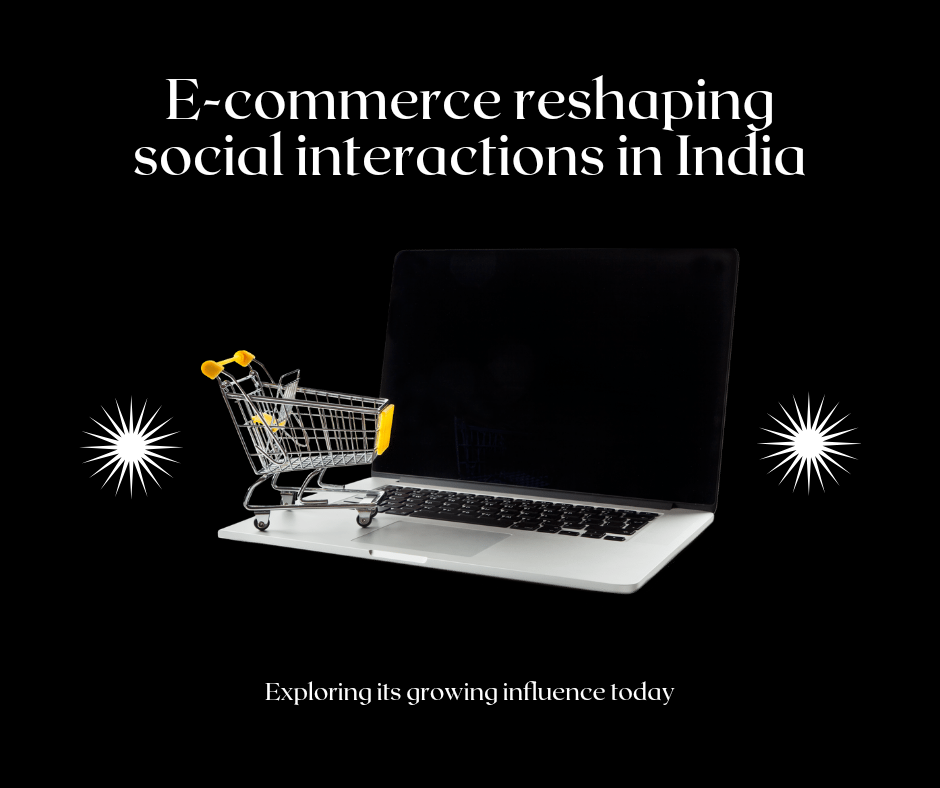The rapid expansion of e-commerce in India has transformed the way we shop, communicate, and live. With a burgeoning internet user base and the proliferation of smartphones, e-commerce has grown exponentially in recent years. According to a report by IBEF, the Indian e-commerce market is expected to reach $120 billion by 2026, up from $38.5 billion in 2017, representing an annual growth rate of 51%. This massive shift towards online retail is not just an economic phenomenon; it is also reshaping the social fabric of the country. In this blog, we'll explore how the increasing penetration of e-commerce is affecting social life in India and the potential long-term implications for social life balance.
The Rise of E-Commerce in India: A Snapshot
E-commerce in India has witnessed unprecedented growth, driven by several factors:
1. Internet Penetration: India had over 700 million internet users by 2022, with projections to cross 900 million by 2025. This widespread access to the internet has made it easier for consumers to shop online.
2. Smartphone Revolution: The affordability of smartphones has enabled a large section of the population to access e-commerce platforms, contributing to the sector's growth.
3. Government Initiatives: Initiatives like 'Digital India' and the push for cashless transactions have further bolstered the growth of e-commerce.
4. COVID-19 Pandemic: The pandemic accelerated the adoption of online shopping, with people turning to e-commerce for essential goods and services during lockdowns.
Impact on Social Life
1. Changes in Shopping Habits
Traditional shopping, which involved social interactions at local markets or malls, is increasingly being replaced by online shopping. This shift is reducing face-to-face interactions, which were once a significant part of the Indian social experience. While online shopping offers convenience, it also isolates individuals from the social activities that were once associated with shopping.
2. Shifts in Consumer Behavior
E-commerce platforms provide a personalized shopping experience, often driven by data analytics and AI. While this enhances consumer satisfaction, it also creates an environment where individuals are more likely to engage in solitary shopping experiences. The sense of community that comes from shopping with friends or family is diminishing, leading to potential changes in social dynamics.
3. Impact on Social Relationships
The convenience of e-commerce has led to a culture of instant gratification. With just a few clicks, products are delivered to one's doorstep, reducing the need to step out. This convenience, while beneficial, can lead to a more sedentary lifestyle and less social interaction. Over time, this could impact relationships, as people may prefer to spend time online rather than engaging in social activities outside the home.
4. Influence on Lifestyle and Work-Life Balance
E-commerce has also blurred the lines between work and personal life. The 24/7 nature of online shopping means that consumers are constantly bombarded with notifications, emails, and advertisements, even during their personal time. This can lead to increased stress and a disrupted work-life balance. Moreover, the gig economy, which supports many e-commerce businesses through delivery services, often requires irregular working hours, further impacting social life and family time.
Long-Term Implications for Social Life Balance
As e-commerce continues to grow, the long-term implications for social life in India could be profound:
1. Reduced Community Engagement: With more people opting for online shopping, there is a risk of reduced community engagement. Local markets and shopping centers, which once served as social hubs, may decline, leading to fewer opportunities for social interaction.
2. Mental Health Concerns: The isolation resulting from reduced social interactions could contribute to mental health issues such as anxiety and depression. The constant online presence required by e-commerce platforms might also lead to digital fatigue, affecting overall well-being.
3. Changing Family Dynamics: The convenience of e-commerce could alter family dynamics, with less time spent together on activities like shopping or dining out. This could weaken family bonds over time, especially if individual online shopping habits replace collective activities.
4. Impact on Social Norms and Values: The shift towards online shopping could also influence social norms and values. Traditional practices like bargaining, which are common in Indian markets, may fade away, leading to a more transactional and less relational approach to shopping and social interactions.
The growth of e-commerce in India is an inevitable part of the digital revolution. While it brings numerous benefits, including convenience and access to a wide range of products, it also poses challenges to social life and long-term social life balance. As we continue to embrace online shopping, it is crucial to be mindful of its impact on our social interactions, mental health, and community engagement. By finding a balance between the convenience of e-commerce and the need for social interaction, we can ensure that the digital economy enhances rather than diminishes our quality of life.
In the coming years, it will be essential for policymakers, businesses, and individuals to consider these social implications and work towards solutions that promote a healthy balance between the digital and social aspects of life in India.





No comments:
Post a Comment